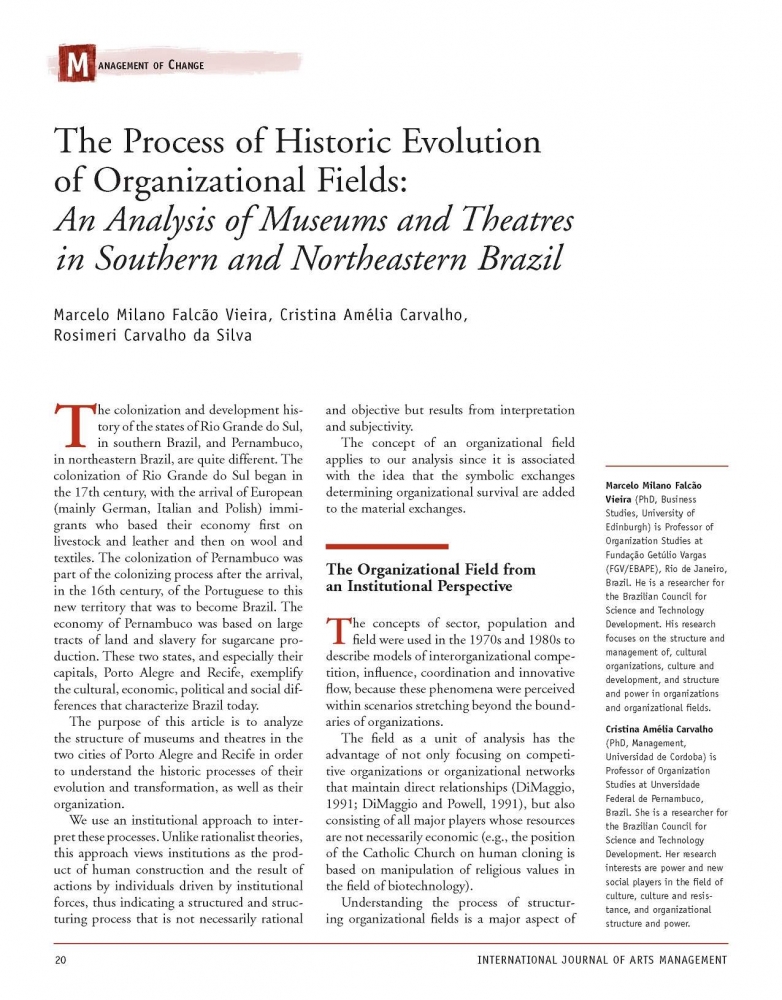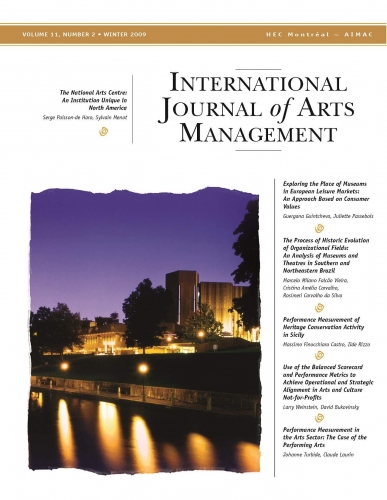The Process of Historic Evolution of Organizational Fields: An Analysis of Museums and Theatres in Southern and Northeastern Brazil
Produit: Article
21,00 $ CA
Marcelo Milano Falcão Vieira, Cristina Amélia Carvalho, Rosimeri Carvalho da Silva
Marcelo Milano Falcão Vieira (PhD, Business Studies, University Of Edinburgh) is Professor of Organization Studies at Fundação Getúlio Vargas (fgV/eBaPe), Rio de Janeiro, Brazil. He is a researcher for the Brazilian Council for Science and Technology Development. His research focuses on the structure and management of, cultural organizations, culture and development, and structure and power in organizations and organizational fields.
Cristina Amélia Carvalho (PhD, Management, Universidad de Cordoba) is Professor of Organization Studies at Unversidade federal de Pernambuco, Brazil. She is a researcher for the Brazilian Council for Science and Technology Development. Her research interests are power and new social players in the field of culture, culture and resistance, and organizational structure and power.
Rosimeri Carvalho da Silva (PhD, Management, HEC Paris) is Professor of Organization Studies at Universidade Federal de Santa Catarina, Brazil. She is a researcher for the Brazilian Council for Science and Technology Development. Her research interests are culture and development, structure and management of cultural organizations, and structure, power and control within organizations.
ABSTRACT
The authors compare the process of structuring a cultural field such as that of museums and theatres in two Brazilian regions, as exemplified by their capital cities: Porto Alegre, in Rio Grande do sul, and Recife, in Pernambuco. The authors use institutional theory to analyze the process of structuring these two organizational fields. The method used is qualitative. Data were collected by means of interviews and observation over a period of five years. The field of museums and theatres in Porto Alegre, though more structured than that in Recife, is nevertheless still in the process of being structured. In both regions the field is fragile, but there have been efforts to accelerate the structuring process, such as by submitting bids in response to invitations from local agencies, especially in Porto Alegre. Although the state plays an important role in the structuring process in both Porto Alegre and Recife, its influence differs in the two regions.
KEYWORDS
Organizational fields, structuring, museums, theatres
RÉSUMÉ
L’article présente une analyse de la structure des musées et des théâtres de deux grandes régions brésiliennes : Porto Alegre et Recife. Cette analyse visait à mieux comprendre les processus historiques ayant caractérisé l’évolution et la transformation du champ culturel des deux régions. L’étude se présente donc comme une démarche d’analyse qualitative de type longitudinal et a amené les chercheurs à réaliser des entretiens et une série d’observations sur une période de cinq ans. Elle permet de conclure que le champ organisationnel des musées et des théâtres est plus structuré à Porto Alegre qu’à Recife. En fait, la région de Recife serait toujours en voie de structuration. On constate toutefois des faiblesses dans les deux régions en dépit d’efforts pour accroître la structuration du champ.
MOTS CLÉS
Champs organisationnels, structuration, musées, théâtres
RESUMEN
Los autores de este trabajo cotejan el proceso de estructuración de un área de actividad cultural, como es el caso de los museos y teatros de dos regiones brasileñas, tomando como ejemplo dos de sus capitales estaduales: Porto Alegre, en Rio Grande do Sul, y Recife, en Pernambuco. Valiéndose de la teoría de las instituciones, utilizan una metodología cualitativa para analizar el proceso por el cual se estructuran estos dos campos de actividad. Los datos se recogieron mediante entrevistas y observaciones a lo largo de cinco años. El área de los museos y teatros en Porto Alegre, aunque mejor estructurada que en Recife, está aún en proceso de articulación. La fragilidad del área es un rasgo común a ambas regiones, pero se han realizado esfuerzos para acelerar el proceso de estructuración, incluidas las presentaciones a los llamados a concurso efectuados por las autoridades locales, particularmente en Porto Alegre. Si bien el Estado desempeña un papel importante en el proceso de estructuración en ambas ciudades, su influencia varía entre una región y otra.
PALABRAS CLAVE
Áreas de actividad, estructuración, museos, teatros

